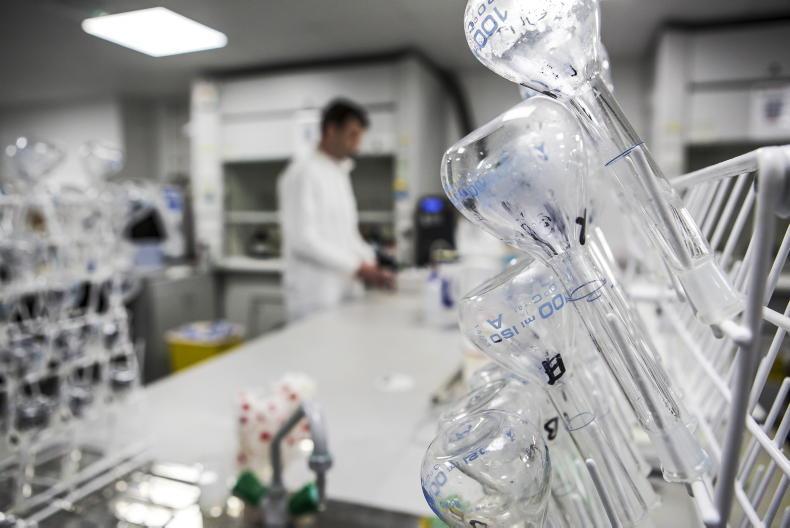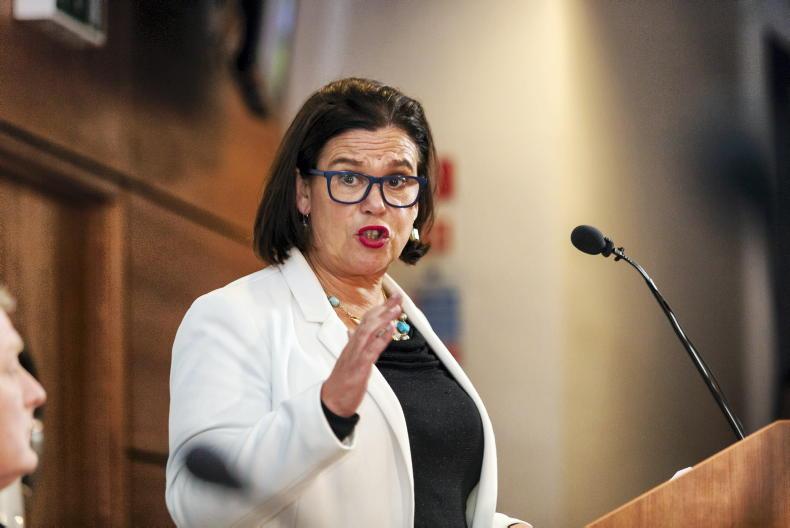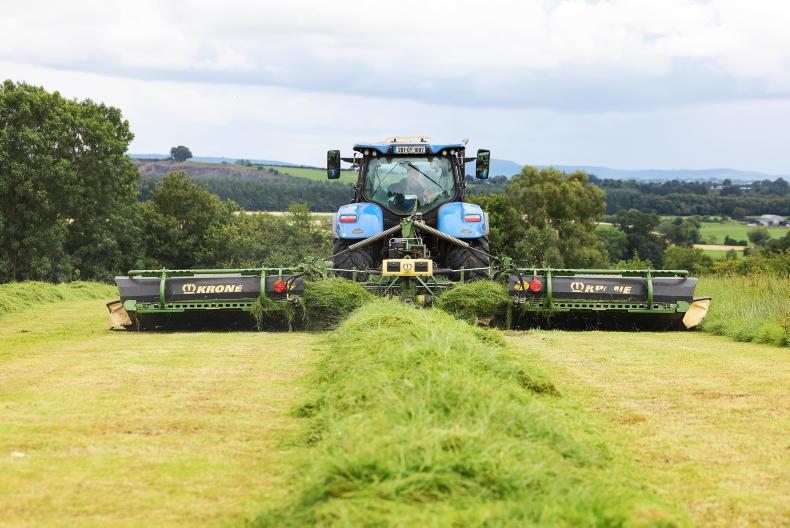The Climate Change Committee, an independent Government advisory body, has published a series of recommendations to help the UK hit emissions targets. In the first of two reports, they call for a dramatic reduction in grazing land and red meat consumption, coupled with an increase in forestry and peat land.
The report states that the “livestock offers the largest potential to deliver cuts in GHG emissions” as it targets reducing emissions of 6-14m tonnes CO2e by 2050:
Reduce meat consumption
The report states that the Government’s ‘Eatwell Guide’, if implemented, would see a reduction in red meat consumption down by 89% for beef and 63% for lamb with a 20% decline in dairy products.
This would be joined with a rise in plant protein with foods like pulses and legumes rising 86% along with fruit and vegetables generally up 54%. Current dietary guidance implies a reduction of 89% in beef consumption and 63% in lamb consumption to 2.2g and 2.6g respectively.
Whilst the committee does not advocate such a dramatic change, they do want to see falls of between 20-50% in beef, lamb and dairy consumption. They believe that this could come as people continue to switch to pork and chicken.
This, they believe, will free up land from beef and sheep production, as reducing the area of land used for livestock is a key element of their recommendations. However, they do admit that they need to assess the environmental impact of protein and dairy alternatives such as almond and soya milk before full backing large-scale changes.
This would be an acceleration of a trend already happening as the UK Family Food Statistics, consumption of beef and lamb/mutton has fallen by 24% and 72% respectively between 1990 and 2017.
However, this has not been accompanied by a rise in the consumption of vegetables which declined by 8% over the period. Official figures suggest that the proportion of the UK population that is vegetarian or vegan has increased from 1.6% in 2009 to 2.5% in 2015.
Planting more trees
The report calls for a dramatic increase in the number of trees, up to 1.5m hectares, to be used to sequester carbon.
Planting more trees so the area of forest rises from 13% to 19% of the UK. They go onto to state that Scotland has a greater capacity to stop farming and to plant more trees than other areas of the UK.
To help act as a carbon sink they would like 55-70% of the UK’s historic peat lands to be restored.
Further, with a growing UK population the committee accept that the urban area will grow from 8-12% of the UK.
All of these additional requirements on the UK’s land means the committee would like to see a 26-36% reduction in grasslands and rough grazing by 2050.
More intensive livestock production
Whilst there is a demand in the report to switch away from large areas of grassland in the UK, those areas left producing livestock need to be more productivity. This is based on the reports assumption that there must not be a shortfall in supply for market demand.
To do this, the report highlights the benefits of animal health schemes to increase efficiency. They suggest that tackling BVD, mastitis and parasites could see £300m saved from the UK sector.
Some of the modelling has been done on the premise that there is a 50% increase in average stocking rate for the areas left producing livestock.
This means lowland farms may see more cattle and sheep and upland and hill farms put them off. The report goes on to recommend paddock grazing as a way of increasing productivity and intensity.
Crop concern
The Climate Change Committee’s report calls for greater efficiency in achieving high crop yields.
They point towards better fertiliser use and ensuring an adequate supply of trace elements like zinc and copper. The report points out that in the last 30 years, yields have only increased by an average of 0.5% per annum compared to the more than doubling which happened since World War II. Whilst the UK’s average yield of 8t of wheat a hectare is above the EU average it is below competitors like France, Germany and the Netherlands. To help improve UK yields the committee calls for better plant breeding.
They do claim that there is less scope for dramatic reduction in emissions in the crop farming.
They do believe that increased yields will allow 10-17% of cropland to be dedicated to other uses than food.
Previous policies failing
The report takes a swipe at previous Government policies for focusing too much on food production.
They call the current approach too fragmented and is to blame for the UK’s comparative low innovation and slow productivity growth.
They believe the current farming support schemes fail to address:
Climate change adaptations.Carbon sequestration and storage.Degradation of the natural environment.Depleted soil fertility through intensive monoculture farming.Biodiversity losses though less semi-natural habitats.Loss of peat lands.Unproductive forests.Highlighting that there has been “no progress reducing agriculture emissions to date”, the committee calls for new policy’s need to pay farmers to:
Plant trees.Restore peat land.Practice low-carbon farming.Improve soil and water quality.Reduce flood risks.Improve the condition of semi-natural habitats. The urge that farmers are only rewarded if they go beyond the current requirements.
Going on to state the Government should help with skills, training and information to implement new uses of land, and support with high up-front costs and long-term pay-backs of investing in alternative uses.
Biomass
A large increase in land used for biomass would help hit climate change targets according to the committee. They would like to see up to 1.2m hectares for bio-energy crops by 2050.
Comment
Kate Rowell
Quality Meat Scotland chair
Kate Rowell said that as well as earning a global reputation for its outstanding taste, quality-assured Scotch Beef and Scotch Lamb has an exceptionally strong story to tell in terms of sustainability and animal welfare.
“The geography of Scotland means that over 80% of Scottish farmland is comprised of grass and rough grazing which is not suitable for growing fruit, cereals and vegetables but ideal for producing top quality beef and lamb using one of our country’s greatest natural assets – grass. This grass also plays an important carbon capture role and sets us apart from other parts of the world where animals are intensively fed on cereals year-round.”
The Scots, she said, were global pioneers in developing quality assurance for beef, lamb and pork and this makes animal health and welfare a priority in an industry which supports 50,000 jobs, many in more fragile rural areas, and contributes more than £2bn to Scotland’s economy.
She also flagged the importance of red meat as part of a healthy, balanced diet. “Independent dietitians and nutritionists without a vegetarian agenda are consistently clear on the importance of red meat in a healthy diet as an excellent natural source of protein, iron, zinc, B vitamins and essential amino acids. It is also sugar and salt-free, unlike many of the meat-free products appearing on the shelves.”
Phil Stocker
NSA chief executive
“Sheep play a huge part in regenerative agriculture, which in turn contributes to keeping our uplands in a good condition and improving our lowlands in terms of soil quality and a return to mixed farming.
“NSA also disputes the science on which standard carbon footprint calculations are based for two main reasons; they do not consider full life cycle analysis and do not consider the role of animals, pasture and carbon sequestration. They also confuse what is essentially a natural carbon cycle that has been going on for thousands of years with an industrial carbon cycle that is dependant on the use of fossil fuels and land use change. It is hugely frustrating that a body like the CCC refuses to accept the wider and more natural aspects of the carbon cycle and rarely seeks to address weaknesses in the system.”
Andrew Midgley
NFUS policy manager
“Livestock production in Scotland is a sustainable, grass-based system that makes the most of our landscape and geography and is the cornerstone of many rural economies throughout the country. More than 80% of Scottish farmland is grass, heather and rough grazing – not suitable for growing fruit, cereals and vegetables – but ideal for locally-produced top-quality milk, beef and lamb. That grass, hill ground and heather also plays an important carbon capture role.
“The strength of our grass-based systems is that it reduces our reliance on imported feedstuffs making our production very distinct from those in other parts of the world. As climate change poses significant risks to global food security, that may give Scotland and the UK a competitive advantage and increase our importance as a food-producing nation.
“NFUS fully accepts that farming has an important role to play in helping tackle climate change, but any changes and challenges driven by new legislation or policies must be managed sensibly and any impacts on farming’s full role in terms of the social, environmental and economic benefits it delivers must also be taken into consideration.
“We will take time to fully digest this report, which is based purely on a modelling exercise, so it is important to understand the assumptions and scenarios that have been considered, including the figures presented on forestry. Some of the changes being suggested, not least the reduction in livestock numbers, will be unacceptable to our industry.
“Significant reductions in the dairy, beef and lamb sectors would put the industry as it exists today under extreme and unacceptable pressure. This would almost inevitably involve farmers going out of business, potential land abandonment and see wider knock on consequences in terms of jobs in the supply chain, the managed landscape of Scotland and spark wholesale changes in the viability of our rural communities.”
The Climate Change Committee, an independent Government advisory body, has published a series of recommendations to help the UK hit emissions targets. In the first of two reports, they call for a dramatic reduction in grazing land and red meat consumption, coupled with an increase in forestry and peat land.
The report states that the “livestock offers the largest potential to deliver cuts in GHG emissions” as it targets reducing emissions of 6-14m tonnes CO2e by 2050:
Reduce meat consumption
The report states that the Government’s ‘Eatwell Guide’, if implemented, would see a reduction in red meat consumption down by 89% for beef and 63% for lamb with a 20% decline in dairy products.
This would be joined with a rise in plant protein with foods like pulses and legumes rising 86% along with fruit and vegetables generally up 54%. Current dietary guidance implies a reduction of 89% in beef consumption and 63% in lamb consumption to 2.2g and 2.6g respectively.
Whilst the committee does not advocate such a dramatic change, they do want to see falls of between 20-50% in beef, lamb and dairy consumption. They believe that this could come as people continue to switch to pork and chicken.
This, they believe, will free up land from beef and sheep production, as reducing the area of land used for livestock is a key element of their recommendations. However, they do admit that they need to assess the environmental impact of protein and dairy alternatives such as almond and soya milk before full backing large-scale changes.
This would be an acceleration of a trend already happening as the UK Family Food Statistics, consumption of beef and lamb/mutton has fallen by 24% and 72% respectively between 1990 and 2017.
However, this has not been accompanied by a rise in the consumption of vegetables which declined by 8% over the period. Official figures suggest that the proportion of the UK population that is vegetarian or vegan has increased from 1.6% in 2009 to 2.5% in 2015.
Planting more trees
The report calls for a dramatic increase in the number of trees, up to 1.5m hectares, to be used to sequester carbon.
Planting more trees so the area of forest rises from 13% to 19% of the UK. They go onto to state that Scotland has a greater capacity to stop farming and to plant more trees than other areas of the UK.
To help act as a carbon sink they would like 55-70% of the UK’s historic peat lands to be restored.
Further, with a growing UK population the committee accept that the urban area will grow from 8-12% of the UK.
All of these additional requirements on the UK’s land means the committee would like to see a 26-36% reduction in grasslands and rough grazing by 2050.
More intensive livestock production
Whilst there is a demand in the report to switch away from large areas of grassland in the UK, those areas left producing livestock need to be more productivity. This is based on the reports assumption that there must not be a shortfall in supply for market demand.
To do this, the report highlights the benefits of animal health schemes to increase efficiency. They suggest that tackling BVD, mastitis and parasites could see £300m saved from the UK sector.
Some of the modelling has been done on the premise that there is a 50% increase in average stocking rate for the areas left producing livestock.
This means lowland farms may see more cattle and sheep and upland and hill farms put them off. The report goes on to recommend paddock grazing as a way of increasing productivity and intensity.
Crop concern
The Climate Change Committee’s report calls for greater efficiency in achieving high crop yields.
They point towards better fertiliser use and ensuring an adequate supply of trace elements like zinc and copper. The report points out that in the last 30 years, yields have only increased by an average of 0.5% per annum compared to the more than doubling which happened since World War II. Whilst the UK’s average yield of 8t of wheat a hectare is above the EU average it is below competitors like France, Germany and the Netherlands. To help improve UK yields the committee calls for better plant breeding.
They do claim that there is less scope for dramatic reduction in emissions in the crop farming.
They do believe that increased yields will allow 10-17% of cropland to be dedicated to other uses than food.
Previous policies failing
The report takes a swipe at previous Government policies for focusing too much on food production.
They call the current approach too fragmented and is to blame for the UK’s comparative low innovation and slow productivity growth.
They believe the current farming support schemes fail to address:
Climate change adaptations.Carbon sequestration and storage.Degradation of the natural environment.Depleted soil fertility through intensive monoculture farming.Biodiversity losses though less semi-natural habitats.Loss of peat lands.Unproductive forests.Highlighting that there has been “no progress reducing agriculture emissions to date”, the committee calls for new policy’s need to pay farmers to:
Plant trees.Restore peat land.Practice low-carbon farming.Improve soil and water quality.Reduce flood risks.Improve the condition of semi-natural habitats. The urge that farmers are only rewarded if they go beyond the current requirements.
Going on to state the Government should help with skills, training and information to implement new uses of land, and support with high up-front costs and long-term pay-backs of investing in alternative uses.
Biomass
A large increase in land used for biomass would help hit climate change targets according to the committee. They would like to see up to 1.2m hectares for bio-energy crops by 2050.
Comment
Kate Rowell
Quality Meat Scotland chair
Kate Rowell said that as well as earning a global reputation for its outstanding taste, quality-assured Scotch Beef and Scotch Lamb has an exceptionally strong story to tell in terms of sustainability and animal welfare.
“The geography of Scotland means that over 80% of Scottish farmland is comprised of grass and rough grazing which is not suitable for growing fruit, cereals and vegetables but ideal for producing top quality beef and lamb using one of our country’s greatest natural assets – grass. This grass also plays an important carbon capture role and sets us apart from other parts of the world where animals are intensively fed on cereals year-round.”
The Scots, she said, were global pioneers in developing quality assurance for beef, lamb and pork and this makes animal health and welfare a priority in an industry which supports 50,000 jobs, many in more fragile rural areas, and contributes more than £2bn to Scotland’s economy.
She also flagged the importance of red meat as part of a healthy, balanced diet. “Independent dietitians and nutritionists without a vegetarian agenda are consistently clear on the importance of red meat in a healthy diet as an excellent natural source of protein, iron, zinc, B vitamins and essential amino acids. It is also sugar and salt-free, unlike many of the meat-free products appearing on the shelves.”
Phil Stocker
NSA chief executive
“Sheep play a huge part in regenerative agriculture, which in turn contributes to keeping our uplands in a good condition and improving our lowlands in terms of soil quality and a return to mixed farming.
“NSA also disputes the science on which standard carbon footprint calculations are based for two main reasons; they do not consider full life cycle analysis and do not consider the role of animals, pasture and carbon sequestration. They also confuse what is essentially a natural carbon cycle that has been going on for thousands of years with an industrial carbon cycle that is dependant on the use of fossil fuels and land use change. It is hugely frustrating that a body like the CCC refuses to accept the wider and more natural aspects of the carbon cycle and rarely seeks to address weaknesses in the system.”
Andrew Midgley
NFUS policy manager
“Livestock production in Scotland is a sustainable, grass-based system that makes the most of our landscape and geography and is the cornerstone of many rural economies throughout the country. More than 80% of Scottish farmland is grass, heather and rough grazing – not suitable for growing fruit, cereals and vegetables – but ideal for locally-produced top-quality milk, beef and lamb. That grass, hill ground and heather also plays an important carbon capture role.
“The strength of our grass-based systems is that it reduces our reliance on imported feedstuffs making our production very distinct from those in other parts of the world. As climate change poses significant risks to global food security, that may give Scotland and the UK a competitive advantage and increase our importance as a food-producing nation.
“NFUS fully accepts that farming has an important role to play in helping tackle climate change, but any changes and challenges driven by new legislation or policies must be managed sensibly and any impacts on farming’s full role in terms of the social, environmental and economic benefits it delivers must also be taken into consideration.
“We will take time to fully digest this report, which is based purely on a modelling exercise, so it is important to understand the assumptions and scenarios that have been considered, including the figures presented on forestry. Some of the changes being suggested, not least the reduction in livestock numbers, will be unacceptable to our industry.
“Significant reductions in the dairy, beef and lamb sectors would put the industry as it exists today under extreme and unacceptable pressure. This would almost inevitably involve farmers going out of business, potential land abandonment and see wider knock on consequences in terms of jobs in the supply chain, the managed landscape of Scotland and spark wholesale changes in the viability of our rural communities.”














SHARING OPTIONS